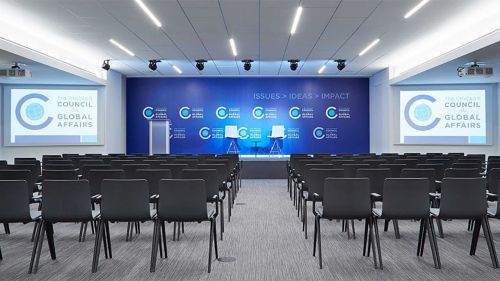How the Council is Responding to the Shutdown

On March 12, the offices and conference center at the Council closed, and all in-person events were cancelled, for an indefinite period.
Council history
The final years of the Council’s first century may prove to be its most momentous. On March 12, our offices and conference center closed, and all in-person events were cancelled, for an indefinite period. For an organization devoted to advancing the connections between Chicago and the world, the arrival of pandemic coronavirus has been as jarring as it is surreal. It is difficult to escape the impression that we are living through the sort of world-shaping events, and the direst of expert warnings, delivered from our stage.
Council distinguished fellow Richard Longworth, who is working on a history of the Council, confirmed that the Council’s offices have never shut down like this before (even snowpocalypse ’11 and polar vortex ’19 only stopped us for a couple of days—and technically the office was open for more adventurous staff). Think about that for a moment: throughout the Great Depression, Pearl Harbor, the Cuban Missile Crisis, and 9/11, the office lights stayed on.
Programming continued too. During the chaotic 1968 Democratic National Convention, for example, devoted members dodged protestors and police to reach an event at the Congress Hotel, Longworth said. There were often robust debates within the organization’s leadership and staff about where the organization should stand on the big issues, but events were never halted. In fact, crises have tended to see a ramping-up of content, driven by our mission to provide concerned members with timely discussions on the world at critical moments.
In that sense at least, this moment is a comforting continuation. While our conference center is currently devoid of life, within two weeks of the office closing we were producing as much programming as we had been before the coronavirus struck. Thankfully we have at our disposal a tool that our predecessors could have only dreamed of: Zoom. As of April 28, 22 programs have been live streamed, including 15 devoted to varying dimensions of the coronavirus crisis, with many more in the works. The Council’s Deep Dish podcast is another marvelous modern innovation that has enabled us to produce content entirely uninterrupted by the office closure. And all of this has been delivered from makeshift offices in Streeterville, Lakeview, Mundeleine, and Western Springs, while toddlers and terriers compete for attention.
This “virtual” world presents boundless opportunities (billions of potential viewers, if we’re feeling ambitious) and access to speakers who no longer have to travel any further than their home office, kitchen table, or—in at least one case—their porch. But there’s also a lot more competition for fickle eyeballs in the rootless ether of the world wide web, and it’s trickier to generate revenue. Then there are the well-publicized peculiarities of Zoom: for our early events, the fact we were never “Zoom bombed” was probably more by luck than design.
As the world is quickly learning, coronavirus is an epic stress test of an organization’s every function. For the Council, it has meant creating the infrastructure and policies to support an entirely remote workforce, all in a matter of days. It has meant building a new programming infrastructure, canceling months of in-person programs, and converting some to digital events. It has meant modifying our communications strategy to penetrate a news cycle dominated by the virus. Across the Council’s three research centers—the Center on Global Cities, the Center on Global Food and Agriculture, and the Lester Crown Center on US Foreign Policy—it has meant contemplating what a world turned upside-down by COVID-19 means for long-term research projects. And it is pushing us to find creative new ways to maintain an all-important sense of community between staff, members, donors, young professionals, and emerging leaders, in an age of prolonged social distancing.
None of these are things we thought we would be doing two months ago. Adjusting to this new reality has taken a big heap of ingenuity and hard work, alongside a growing tolerance for uncertainty. Just as necessity is the mother of invention, so crises prompt the sorts of bold decisions and silo-busting through which organizations evolve. Although the Council has been producing digital content for some time now, it feels like our capabilities have advanced years in the past six weeks. When the lights finally flicker back on in the McCormick Foundation Hall, it will be exciting to explore how we might merge the physical and digital worlds we now inhabit, to create new opportunities for audience engagement. There’ll no doubt be a lot to talk about then, too.
Until then, stay safe, thank you for your support—and see you on Zoom!